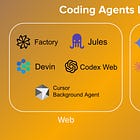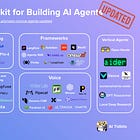LinkedIn Highlights, August 2025 - AI Coding Edition
DeepWiki’s instant repo querying, Claudia’s GUI for Claude Code, Anthropic’s best practices, Task Master coding agents orchestration, plus new document parsing tools from Google and Mistral
Welcome to LinkedIn Highlights!
Each month, I'll share my top-performing LinkedIn posts, bringing you the best of AI straight from the frontlines of academia and industry.
As a frequent LinkedIn contributor, I regularly share insights on groundbreaking papers, promising open-source packages, and useful tools for folks collaborating with AI.
Over the past month, I’ve focused on exploring advanced coding workflows powered by Claude Code and open-source task orchestration tools. This post covers everything from DeepWiki's instant repo querying to Anthropic’s subagent ecosystem, Claude Code best practices, and structured agent workflows with Task Master AI.
To close things out, I also highlight two powerful tools from Google and Mistral for document parsing, which bring new levels of accuracy and traceability to text extraction.
Whether you're not on LinkedIn or simply missed a post, this monthly roundup ensures you stay informed about the most impactful AI news and innovations.
Recent posts on coding with AI
(1) DeepWiki
One of the most underrated AI coding tools released this year has become an essential part of my coding workflow.
DeepWiki, from the team behind Devin the coding agent, turns any GitHub repository into an instant wiki. Replace github.com with deepwiki.com in any repo URL and start asking questions without digging through files.
I now use it for:
Onboarding to unfamiliar codebases - targeted explanations with direct file links
Understanding implementation patterns - authentication flows, state management approaches
Evaluating open-source projects - licensing, security posture, maintenance status
Environment setup - getting exact commands and dependencies with citations
Building context for AI coding agents - structured summaries and architectural overviews
Every answer includes clickable, line-level citations that link back to source files. No hallucinated summaries, just grounded responses tied to actual code.
The tool integrates directly into Claude and Cursor via a free MCP server, making it queryable within your existing workflow.
I've documented 8 specific use cases with examples in a detailed breakdown of how I integrate DeepWiki into my development process https://www.aitidbits.ai/p/deepwiki
(2) Claudia - Manage Claude Code easily
Claude Code just got its first serious GUI.
A two-month-old open-source tool called Claudia turns Claude Code into a full-featured desktop environment for agent-based development with custom agents, usage tracking, session versioning, and a visual project browser that actually makes your ~/.claude directory usable.
Key features:
Project + session management – browse, resume, and diff past sessions across projects, with smart search and visual timelines
Agent creation – build persistent Claude agents with custom prompts, sandboxed permissions, and background execution
Usage tracking – real-time analytics dashboard showing cost per model/project, usage history, and exportable data
MCP support – manage your Model Context Protocol servers from a dedicated UI, with easy import from Claude Desktop
Markdown support – edit, preview, and organize CLAUDE.md files across projects with live rendering and syntax highlighting
Under the hood, Claudia runs on Tauri and supports multi-process execution for non-blocking agent runs.
Claudia makes Claude Code accessible for developers who've been hesitant about command-line AI tools or struggled to track Claude Code sessions across projects.
(My recent approach changed from Claudia + Cursor to Claude Code + Task Manager, but Claudia is still useful for the CLI haters).
GitHub repo https://github.com/getAsterisk/opcode
(3) Anthropic’s tips for using Claude Code
The Claude Code team just revealed how they responsibly merged 22,000 lines of AI-generated code into production.
Their breakthrough? They stopped treating AI like a magic wand and started managing it like you would any capable but inexperienced team member.
Here are the five best practices they shared for "vibe coding" in prod:
(1) Be Claude's product manager - spend 15-20 minutes collecting requirements, exploring the codebase, and building a plan together before letting the AI execute. Just like you wouldn't tell a new hire "build this feature" without context.
(2) Focus on leaf nodes, not core architecture - use AI for end features and components that nothing else depends on. Protect your system's trunk and branches where tech debt would be catastrophic.
(3) Design for verifiability - create systems with easily verifiable inputs/outputs and stress tests. You need to validate correctness without reading every line of generated code.
(4) Prepare for the exponential - AI can handle ~1-hour tasks today, but that capability doubles every 7 months. Next year, it'll tackle day-long projects, then week-long ones. If you insist on reviewing every line of code, you'll become the bottleneck.
(5) Know enough to ask the right questions - You still need technical judgment to guide the AI safely. The vulnerabilities in vibe-coded apps come from people who can't distinguish between what's dangerous and what's safe.
The bottom line: we're moving from individual contributors who understand every line to managers who understand the system. The question isn't whether this will happen, but whether you'll be ready when it does.
Full talk
(4) Claude Code Subagents
Claude Code now supports custom subagents, and a new open-source site makes it dramatically easier to start using them.
Claude Code's sub-agent feature lets you delegate to specialized AI experts instead of relying on one overwhelmed assistant. Each subagent operates within its own context window and focuses on its own expertise, much like having a full development team where every member excels in their specific domain.
This new site features 30+ prebuilt Claude Code agents, from UX Optimizer to System Architect to User Researcher. Each is designed to handle a specific task in your workflow. Just click, copy the prompt, and deploy.
These agents coordinate automatically. Ask Claude to "build a secure payment feature" and watch the system architect design the API, the security auditor validate the implementation, and the test generator create comprehensive coverage - all working in parallel.
No more crafting detailed system prompts or figuring out tool permissions - just copy-paste the configurations you need and integrate them in seconds.
Website https://www.subagents.cc
(5) Claude Code tips
Anthropic just shared how their teams actually use Claude Code internally, revealing how frontier labs operate at the cutting edge. An interesting peek behind the scenes.
I expected the usual suspects: debugging, code reviews, boilerplate generation. But applications go far beyond typical developer workflows. Their lawyers built phone tree systems. Marketing teams generate hundreds of ad variations in seconds using specialized sub-agents that process CSV files. Data scientists without TypeScript knowledge are building complete React applications for ML model visualization.
The performance gains are substantial: security engineers reduced debugging time from 15 minutes to 5 minutes by feeding Claude stack traces during production incidents. New data scientists become productive on complex codebases immediately rather than spending weeks learning architecture. Research time for unfamiliar ML functions dropped by 80%.
What's particularly notable is how this shifts organizational dynamics. Product engineers now tackle bugs in unfamiliar codebases without depending on other teams. The Growth Marketing team built agentic workflows that would traditionally require dedicated developer resources.
Claude Code is not only for coding. My observation: we're seeing the early manifestation of a fundamental change in how companies operate. That has been the vibe for some time, but now we actually see this in practice.
Full piece https://www.anthropic.com/news/how-anthropic-teams-use-claude-code
(6) Task Master AI
Keep reading with a 7-day free trial
Subscribe to AI Tidbits to keep reading this post and get 7 days of free access to the full post archives.










